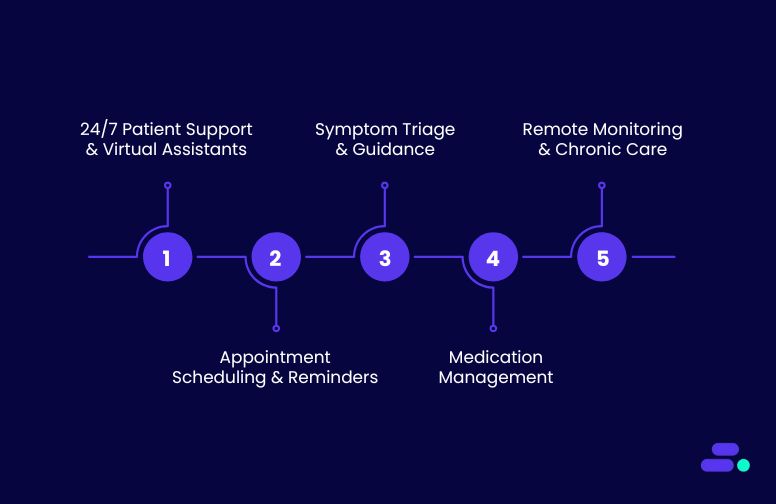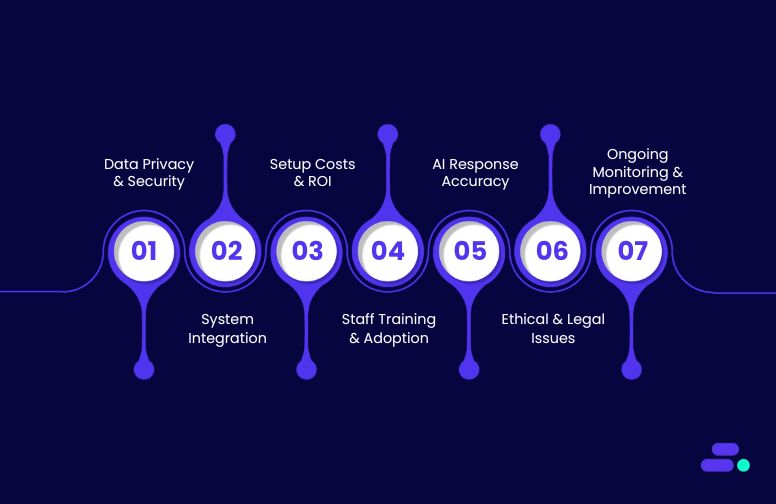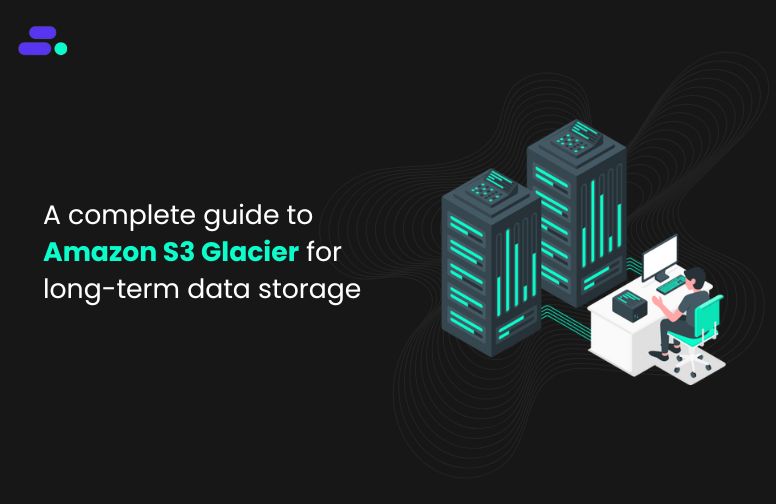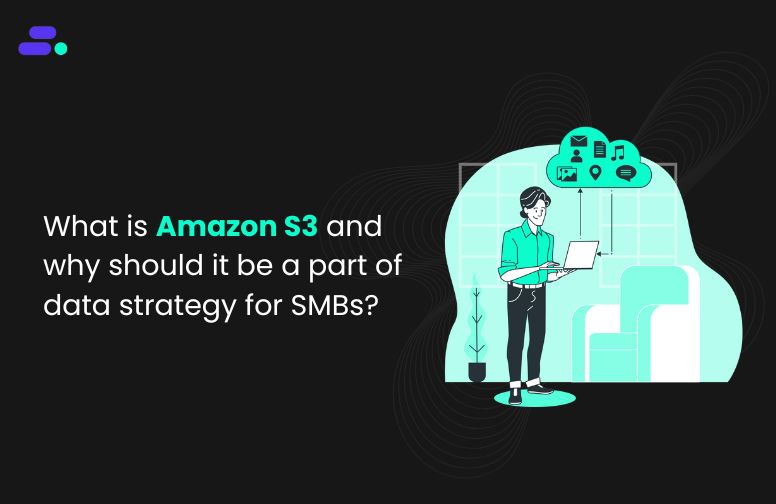This is a div block with a Webflow interaction that will be triggered when the heading is in the view.

Modernize your cloud. Maximize business impact.
Amazon Elastic Container Service (Amazon ECS) and Amazon Elastic Kubernetes Service (Amazon EKS) simplify how businesses run and scale containerized applications, eliminating the complexity of managing complex infrastructure. Unlike open-source options that demand significant in-house expertise, these managed AWS services automate deployment and security, making them a strong fit for teams focused on speed and growth.
The impact is evident. The global container orchestration market reached $332.7 million in 2018 and is projected to surpass $1382.1 million by 2026, driven largely by businesses adopting cloud-native architectures.
While both services help you deploy, manage, and scale containers, they differ significantly in how they operate, who they’re ideal for, and the level of control they offer.
This guide provides a detailed comparison of Amazon ECS vs EKS, highlighting the technical and operational differences that matter most to businesses ready to modernize their application delivery.
Key Takeaways
- Amazon ECS and Amazon EKS both deliver managed container orchestration, but Amazon ECS focuses on simplicity and deep AWS integration, while Amazon EKS offers portability and advanced Kubernetes features.
- Amazon ECS is a strong fit for businesses seeking rapid deployment, cost control, and minimal operational overhead, while Amazon EKS suits teams with Kubernetes expertise, complex workloads, or hybrid and multi-cloud needs.
- Pricing structures differ: Amazon ECS has no control plane fees, while Amazon EKS charges a management fee per cluster in addition to resource costs.
- Partnering with Cloudtech gives businesses expert support in evaluating, adopting, and optimizing Amazon ECS or Amazon EKS, ensuring the right service is chosen for long-term growth and reliability.
What is Amazon ECS?
Amazon ECS is a fully managed container orchestration service that helps organizations easily deploy, manage, and scale containerized applications. It integrates AWS configuration and operational best practices directly into the platform, eliminating the complexity of managing control planes or infrastructure components.
The service operates through three distinct layers that provide comprehensive container management capabilities:
- Capacity layer: The infrastructure foundation where containers execute, supporting Amazon EC2 instances, AWS Fargate serverless compute, and on-premises deployments through Amazon ECS Anywhere.
- Controller layer: The orchestration engine that deploys and manages applications running within containers, handling scheduling, availability, and resource allocation.
- Provisioning layer: The interface tools that enable interaction with the scheduler for deploying and managing applications and containers.
Key features of Amazon ECS
Amazon Elastic Container Service (ECS) is purpose-built to simplify container orchestration, without overwhelming businesses with infrastructure management.
Whether you're running microservices or batch jobs, Amazon ECS offers impactful features and tightly integrated components that make containerized applications easier to deploy, secure, and scale.
- Serverless integration with AWS Fargate: AWS Fargate is directly integrated into Amazon ECS, removing the need for server management, capacity planning, and manual container workload isolation.
Businesses define their application requirements and select AWS Fargate as the launch type, allowing AWS Fargate to automatically manage scaling and infrastructure. - Autonomous control plane operations: Amazon ECS operates as a fully managed service, with AWS configuration and operational best practices built in.
There is no need for users to manage control planes, nodes, or add-ons, which significantly reduces operational overhead and ensures enterprise-grade reliability. - Security and isolation by design: The service integrates natively with AWS security, identity, and management tools. This enables granular permissions for each container and provides strong isolation for application development. Organizations can deploy containers that meet the security and compliance standards expected from AWS infrastructure.
Key components of Amazon ECS
Amazon ECS relies on a few core components to run containers efficiently. From defining how containers run to keeping your applications available at all times, each plays an important role.
- Task definitions: JSON-formatted blueprints that specify how containers should execute, including resource requirements, networking configurations, and security settings.
- Clusters: The infrastructure foundation where applications operate, providing the computational resources necessary for container execution.
- Tasks: Individual instances of task definitions representing running applications or batch jobs.
- Services: Long-running applications that maintain desired capacity and ensure continuous availability.
Together, these features and components enable businesses to focus on building and deploying applications without being hindered by infrastructure complexity.
Amazon ECS deployment models

Amazon ECS provides businesses with the flexibility to run containers in a manner that aligns with their specific needs and resources. Here are the main deployment models that cover a range of preferences, from fully managed to self-managed environments.
- AWS Fargate Launch Type: A serverless, pay-as-you-go compute engine that enables application focus without server management. AWS Fargate automatically manages capacity needs, operating system updates, compliance requirements, and resiliency.
- Amazon EC2 Launch Type: Organizations choose instance types, manage capacity, and maintain control over the underlying infrastructure. This model suits large workloads requiring price optimization and granular infrastructure control.
- Amazon ECS Anywhere: Provides support for registering external instances, such as on-premises servers or virtual machines, to Amazon ECS clusters. This option enables consistent container management across cloud and on-premises environments.
Each deployment model supports a range of business needs, making it easier to match the service to specific use cases.
How businesses can use Amazon ECS
Amazon ECS supports a wide range of business needs, from updating legacy systems to handling advanced analytics and data processing. These use cases highlight how the service can help businesses address real-world challenges and scale with confidence.
- Application modernization: The service empowers developers to build and deploy applications with improved security features in a fast, standardized, compliant, and cost-efficient manner. Businesses can use this capability to modernize legacy applications without extensive infrastructure investments.
- Automatic web application scaling: Amazon ECS automatically scales and runs web applications across multiple Availability Zones, delivering the performance, scale, reliability, and availability of AWS infrastructure. This capability is particularly beneficial for businesses that experience variable traffic patterns.
- Batch processing support: Organizations can plan, schedule, and run batch computing workloads across AWS services, including Amazon EC2, AWS Fargate, and Amazon EC2 Spot Instances. This flexibility enables cost-effective processing of periodic workloads common in business operations.
- Machine learning model training: Amazon ECS supports training natural language processing and other artificial intelligence and machine learning models without managing infrastructure by using AWS Fargate. Businesses can use this capability to implement data-driven solutions without significant infrastructure investments.
While Amazon ECS offers a seamless way to manage containerized workloads with deep AWS integration, some businesses prefer the flexibility and portability of Kubernetes, especially when operating in hybrid or multi-cloud environments. That’s where Amazon EKS comes in.
What is Amazon EKS?
Amazon Elastic Kubernetes Service (EKS) is a managed Kubernetes service that simplifies running Kubernetes on AWS and on-premises environments. This eliminates the need for organizations to install and operate their own Kubernetes control plane.
Kubernetes serves as an open-source system for automating the deployment, scaling, and management of containerized applications, while Amazon EKS provides the managed infrastructure to support these operations.
The service automatically manages the availability and scalability of Kubernetes control plane nodes, which are responsible for scheduling containers, managing application availability, storing cluster data, and executing other critical tasks. Amazon EKS is certified Kubernetes-conformant, ensuring existing applications running on upstream Kubernetes remain compatible with Amazon EKS.
Key features of Amazon EKS
Amazon EKS combines features that enable businesses to run Kubernetes clusters with reduced manual effort and enhanced security. Here are the key capabilities that make the service practical and reliable for a range of workloads.
- Amazon EKS Auto Mode: This feature fully automates the management of the Kubernetes cluster infrastructure, including compute, storage, and networking. Auto Mode provisions infrastructure, scales resources, optimizes costs, applies patches, manages add-ons, and integrates with AWS security services with minimal user intervention.
- High availability and scalability: The managed control plane is automatically distributed across three Availability Zones for fault tolerance and automatic scaling, ensuring uptime and reliability.
- Security and compliance integration: Amazon EKS integrates with AWS Identity and Access Management, encryption, and network policies to provide fine-grained access control, compliance, and security for workloads.
- Smooth AWS service integration: Native integration with services such as Elastic Load Balancing, Amazon CloudWatch, Amazon Virtual Private Cloud, and Amazon Route 53 for networking, monitoring, and traffic management.
Key Components of Amazon EKS
To support these features, Amazon EKS includes several key components that act as its operational backbone:
- Managed control plane: The managed control plane is the core Kubernetes control plane managed by AWS. It includes the Kubernetes Application Programming Interface server, etcd database, scheduler, and controller manager, and is responsible for cluster orchestration, health monitoring, and high availability across multiple AWS Availability Zones.
- Managed node groups: Managed node groups are Amazon EC2 instances or groups of instances that run Kubernetes worker nodes. AWS manages its lifecycle, updates, and scaling, allowing organizations to focus on workloads rather than infrastructure.
- Amazon EKS add-ons: These are curated sets of Kubernetes operational software (such as CoreDNS and kube-proxy) provided and managed by AWS to extend cluster functionality and ensure smooth integration with AWS services.
- Service integrations (AWS Controllers for Kubernetes): These controllers allow Kubernetes clusters to directly manage AWS resources (such as databases, storage, and networking) from within Kubernetes, enabling cloud-native application patterns.
Together, these capabilities and components make Amazon EKS a practical choice for businesses seeking flexibility, security, and operational simplicity, whether running in the cloud or on-premises.
What deployment options are available for Amazon EKS?
Amazon EKS provides several options for businesses to run their Kubernetes workloads, each with its own unique balance of control and convenience. Here are the primary deployment options that enable organizations to align their resources and goals.
- Amazon EC2 Node Groups: Organizations choose instance types, pricing models (on-demand, spot, reserved), and node counts, providing high control with higher management responsibility.
- AWS Fargate Integration: AWS Fargate eliminates node management but costs scale linearly with pod usage, making it suitable for applications with predictable resource requirements.
- AWS Outposts: Enterprise hybrid model with custom pricing, typically not cost-efficient for small teams but ideal for organizations requiring on-premises Kubernetes capabilities.
- Amazon EKS Anywhere: No AWS charges, but organizations manage everything and lose cloud-native elasticity unless combined with autoscalers.
These deployment choices open up a range of practical use cases for businesses across different industries and technical requirements.
How can businesses use Amazon EKS?

Amazon EKS supports a variety of business needs, from building reliable applications to supporting data science teams. These use cases demonstrate how the service enables organizations to manage complex workloads and remain flexible as requirements evolve.
- High-availability applications deployment: Using Elastic Load Balancing ensures applications remain highly available across multiple Availability Zones. This capability supports mission-critical applications requiring continuous operation.
- Microservices architecture development: Organizations can utilize Kubernetes service discovery features with AWS Cloud Map or Amazon Virtual Private Cloud Lattice to build resilient systems. This approach enables scalable, maintainable application architectures.
- Machine learning workload execution: Amazon EKS supports popular machine learning frameworks such as TensorFlow, MXNet, and PyTorch. With Graphics Processing Unit support, organizations can handle complex machine learning tasks effectively.
- Hybrid and multi-cloud deployments: The service enables consistent operation on-premises and in the cloud using Amazon EKS clusters, features, and tools to run self-managed nodes on AWS Outposts or Amazon EKS Hybrid Nodes.
Comparing these Amazon services helps businesses identify where each service excels and what sets them apart. Choosing between the two depends on your team's expertise, application needs, and the level of control you want over your orchestration layer.
Key differences between Amazon ECS and Amazon EKS
Amazon ECS is a fully managed, AWS-native service that’s simpler to set up and use. On the other hand, Amazon EKS is built on Kubernetes, offering more flexibility and portability for teams already invested in the Kubernetes ecosystem.
When comparing Amazon ECS and Amazon EKS, several key differences emerge in how they handle orchestration, integration, and day-to-day management.
The core differences between Amazon ECS and Amazon EKS enable businesses to make informed decisions based on their technical capabilities, resource needs, and long-term objectives. However, to choose the right fit, it's just as important to consider practical use cases.
When to choose AWS ECS or AWS EKS?
Selecting the right container service depends on your team’s expertise, workload complexity, and operational priorities. Below are common business scenarios to help you determine whether Amazon ECS or Amazon EKS is the better fit for your application needs.
Choose Amazon ECS when:
Some situations require a service that keeps things straightforward and allows teams to move quickly. These points highlight when Amazon ECS is the right match for business needs.
- Operational simplicity is the priority: Amazon ECS excels when organizations prioritize powerful simplicity and prefer an AWS-opinionated solution. The service is ideal for teams new to containers or those seeking rapid deployment without complex configuration requirements.
- Deep AWS integration is required: Organizations fully committed to the AWS ecosystem benefit from smooth integration with AWS services, including AWS Identity and Access Management, Amazon CloudWatch, and Amazon Virtual Private Cloud. This integration accelerates development and reduces operational complexity.
- Cost optimization is essential: Amazon ECS can be more cost-effective, especially for smaller workloads, as it eliminates control plane charges. Businesses benefit from pay-as-you-go pricing across multiple AWS compute options.
- Quick time-to-market is critical: Amazon ECS reduces the time required to build, deploy, or migrate containerized applications successfully. The service enables organizations to focus on application development rather than infrastructure management.
Choose Amazon EKS when:
Some businesses require more flexibility, advanced features, or the ability to run workloads across multiple environments. These points show when Amazon EKS is the better choice.
- Kubernetes expertise is available: Organizations with existing Kubernetes knowledge can use the extensive Kubernetes ecosystem and community. Amazon EKS enables the utilization of existing plugins and tooling from the Kubernetes community.
- Portability requirements are crucial: Amazon EKS offers vendor portability, preventing vendor lock-in and enabling workload operation across multiple cloud providers. Applications remain fully compatible with any standard Kubernetes environment.
- Complex workloads require advanced features: Applications requiring advanced Kubernetes features like custom resource definitions, operators, or advanced networking configurations benefit from Amazon EKS. The service supports complex microservices architectures and machine learning workloads.
- Hybrid deployments are necessary: Organizations needing consistent container operation across on-premises and cloud environments can utilize Amazon EKS. The service supports AWS Outposts and Amazon EKS Hybrid Nodes for comprehensive hybrid strategies.
Choosing between Amazon ECS and Amazon EKS can be challenging, particularly when considering the balance of cost, complexity, and future scalability. That’s where partners like Cloudtech step in.
How Cloudtech supports businesses comparing Amazon ECS vs EKS
Cloudtech is an advanced AWS partner that helps businesses evaluate their current infrastructure, technical expertise, and long-term goals to make the right choice between Amazon ECS and Amazon EKS, and support them every step of the way.
With a team of AWS-certified experts, Cloudtech offers end-to-end cloud transformation services, from crafting customized AWS adoption strategies to modernizing applications with Amazon ECS and Amazon EKS.
By partnering with Cloudtech, businesses can confidently compare Amazon ECS vs. EKS, select the right service for their needs, and receive expert assistance every step of the way, from planning to ongoing optimization.
Conclusion
Selecting between Amazon ECS and Amazon EKS comes down to the specific needs, technical skills, and growth plans of each business. Both services offer managed container orchestration, but the right fit depends on factors such as operational preferences, integration requirements, and team familiarity with container technologies.
For SMBs, this choice has a direct impact on deployment speed, ongoing management, and the ability to scale applications with confidence.
For businesses seeking to maximize their investment in AWS, collaborating with an experienced consulting partner like Cloudtech can clarify the Amazon ECS vs. EKS decision and streamline the path to modern application delivery. Get started with us!
FAQs
- Can AWS ECS and EKS run workloads on the same cluster?
No, ECS and EKS are separate orchestration platforms and do not share clusters. Each manages its own resources, so workloads must be deployed to either an ECS or EKS cluster, not both.
- How do ECS and EKS handle IAM permissions differently?
ECS uses AWS IAM roles for tasks and services, making it straightforward to assign permissions directly to containers. EKS, built on Kubernetes, integrates with IAM using Kubernetes service accounts and the AWS IAM Authenticator, which can require extra configuration for fine-grained access.
- Is there a difference in how ECS and EKS support hybrid or on-premises workloads?
ECS Anywhere and EKS Anywhere both extend AWS container management to on-premises environments, but EKS Anywhere offers a Kubernetes-native experience, while ECS Anywhere is focused on ECS APIs and workflows.
- Which service offers simpler integration with AWS Fargate for serverless containers?
Both ECS and EKS support AWS Fargate, but ECS typically offers a more direct and streamlined setup for running serverless containers, with fewer configuration steps compared to EKS.
- How do ECS and EKS differ in their support for multi-region deployments?
ECS provides multi-region support through its own APIs and service discovery, while EKS relies on Kubernetes-native tools and add-ons for cross-region communication, which may require extra setup and management.

Get started on your cloud modernization journey today!
Let Cloudtech build a modern AWS infrastructure that’s right for your business.

















